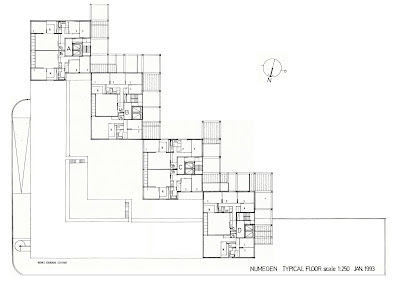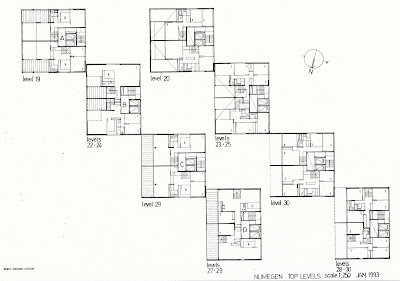GA Gallery, Tokyo
Sous la direction de Yukio Futagawa
4 mars au 7 avril 1993
Participation de Henri Ciriani
The City of Nijmegen, with a population of
145.000, a Catholic University of 20.000 students, shares with the city of
Arnheim (to the east of the Netherlands) a vast plain occupied by the busy
river Waal.
Major features
Our project will be the vertical landmark
of the city's new developing west area and harbour.
The new project will provide identity,
visual and functional connections with the central core and enliven the
immediate environment by the quality of its dwellings and gardens.
Parallel to the riverfront is the base of a
triangular shaped site whose other two sides are very different: one very
strongly felt --to the south-east-- because of an elevated railway track and
the other poorly defined by sad low-rise housing schemes.
To cope with these elements the building's
form is a linear figure produced by four square towers joined together by their
diagonals in plan and revealing a structure of stepped volumes in elevation
(from the river up, from 20 to 30 storeys high or 90 meters).
These towers are grounded to the site by a
right-angled podium fostering a continuous movement between verticality and
horizontality. This diagonally sustained shape looks differently from all four
sides, thus providing a good urban orientation device.
This form also permits to represent itself
differently from the city and from the suburbs, while creating a new frontality
between river and garden, with apartments where the space flows through large
glazed openings into far away views to the north (the river), or to the more
secluded ones through the second-storey-high gardens overlooking the sunny
south (the city).
These hanging gardens are used as a screen
to railroad noise as well as to relate to the city's park on the other side of
the tracks, giving the historical centre the image of a vertical garden.
From the other sides --that tower the
countryside far beyond-- the towers will look more abstract, their use of
colour contributing to their strong pictorial image.
Our first proposal treated the gardens in a
more autonomous way, creating a circular independent structure linked to the
towers by individual bridges. This structure, as well as the shops and offices
of the original project, were removed in order to give the project a stronger
residential image.
Henri Ciriani





